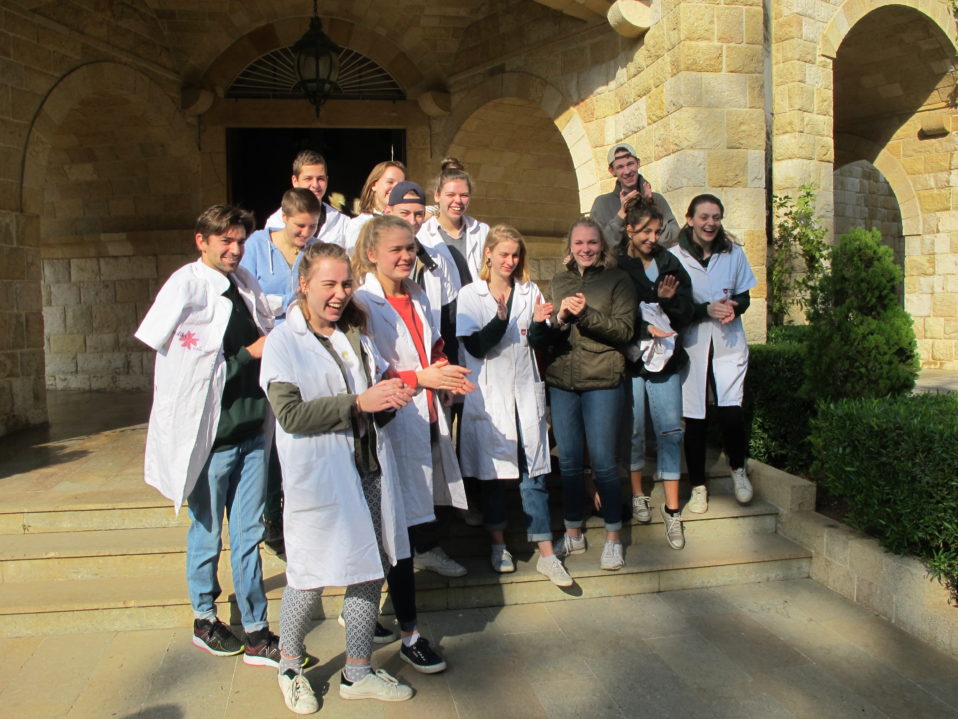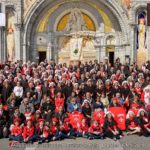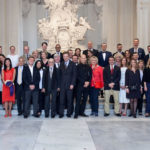By Doreen Abi Raad.
Anthony can hardly contain his delight, as he spins around with a huge smile and shining eyes.
That joy is typical of the reaction of Anthony and his fellow residents at a psychiatric institution when the Caravan group with the Order of Malta Lebanon comes to visit three times a week.
Anthony basks in the undivided attention from Caravanista Antonie Borggreve as they dance to the beat of background music, their arms flapping together in harmony.
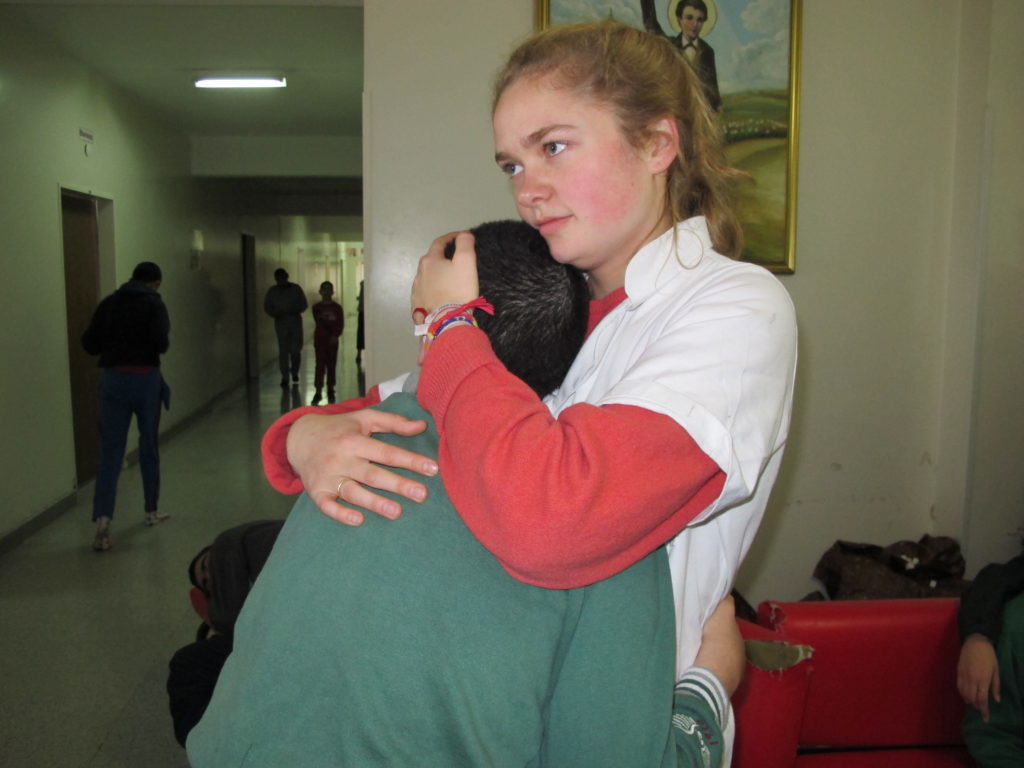
Nearby, Toufic and Caravanista Felicitas von Kessel sit side-by-side. When Felicitas whistles a soft bird call near Toufic’s ear followed by a kiss on his cheek, he shyly smiles as he leans forward with a shiver of elation.
It’s all part of the Caravan program, a joint initiative of the German and Lebanese Associations of the Order of Malta, that brings youth 18 and older from abroad to Lebanon for 10 months to serve the disabled community, who are affectionately referred to as “guests.”
Now in its 10th year, the Caravan project sprung forth from the Order of Malta Lebanon’s Chabrouh camps for the mentally and physically disabled so as to offer its guests continuity throughout the year in their everyday institutional environment.
Typically, Caravanistas choose to spend an enriching “gap year” before entering university. While currently a German-Lebanese project, the Order of Malta Lebanon aims to broaden the scope of the Caravan program with international participation. Although the current Caravan gathers 14 youth from Germany and one from Belgium, previous Caravan groups had gathered youth from many other European countries.
Their Caravan adventure began with a ten days introductory camp in Lebanon to then participate in the summer Chabrouh camps. There, in Chabrouh’s pristine mountain setting, the Caravanistas get personally acquainted with many of the guests whom they will later visit in institutional facilities.
“Even though it was exhausting, it was so beautiful,” Felicitas says of her experience at Chabrouh. “Your heart gets open.”
Although Caravan participants usually don’t have prior experience working with the mentally and physically disabled, they are drawn to the Order’s spirit of serving guests with love, upholding the dignity of every human being.
Where Anthony and Toufic live, for example, the ratio of caregivers to residents is 60 to 3, which does not allow much opportunity for individual attention. Caravanistas — as well as local Order of Malta youth volunteers who visit such facilities — fill that void, showering guests with unconditional love. A caretaker likened their visits to that of extended family, like aunts and uncles, nurturing special bonds with their presence.
“It was hard at first,” admits Antonie. “But my role is to give and show the guests as much joy and love as I can. And I feel that I receive so much more from the guests than I give to them. It’s amazing. When you receive a smile from a guest and feel that you are making new steps and the relationship is growing closer, it’s an incredible joy.”

Caravanista Leopoldina von Waldburg observes, “we realize they are people, just like us. They have feelings and a great capacity to love. I see that my guests each have their own personalities. Not only do we call them our guests, but they are our friends, our ‘habibis’ (sweethearts).”
Living together in a house close to Beirut, the Caravanistas share day-to-day responsibilities, including cooking and cleaning. This sense of community and the opportunity to share with each other the emotions, challenges and progress they experience with guests is a constant source of strength and support.
The Caravanistas are also sustained by prayer. They pray together several times a day, beginning with morning prayers. In particular, they pray for God’s strength and guidance before embarking on a visit to a facility to spend time with their guests.
“In making our guests our first priority, I grew in faith,” notes Felicitas.
The varied, full Caravan schedule includes Lebanese language lessons in their group home as well as attending the Jesuit Saint Joseph University in Beirut (USJ) for a specially designed curriculum that includes the history of the Middle East, Christianity and Islam for which 16 internationally recognized ECTS points (European Credit Transfer System) are awarded.
Throughout their stay, the Caravanistas also assist in teaching English and math in a school for Syrian refugee children.
The Caravan itinerary also features regular excursions to explore Lebanon’s historical sites and opportunities to experience its rich culture.
Like her fellow Caravanistas, one of the most difficult challenges Felicitas foresees is that it will be “so horrible to say goodbye” to the guests when it’s time to leave Lebanon. But what gives consolation, Felicitas explained, is that “there always will be someone who will be loving our guests,” thanks to the Chabrouh summer camps and subsequent Caravan groups. “That’s what makes the Caravan program so special.”
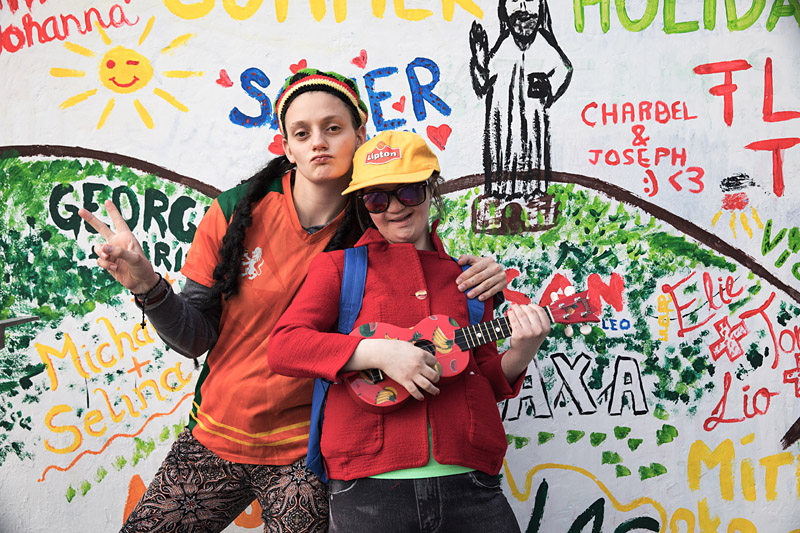
Each Caravan group also leaves a legacy in Lebanon. At the psychiatric institution, for example, colorful murals grace many of its walls. One group even funded a special therapeutic sensory room there, designed to awaken and facilitate the seven senses.
Since its inception in 2009, a total of 122 youth participated in the Caravan project, and around 15 are expected for the coming year. Their involvement continues way beyond Lebanon. Back in their homelands, Caravan alumni serve as unofficial ambassadors as they share their extraordinary experiences with others abroad, thus building momentum internationally for participation in future Caravan programs in Lebanon.
And every two years, the Caravan community also have an opportunity to rekindle and forge new bonds with their peers and guests during a Caravan Alumni camp at Chabrouh.




